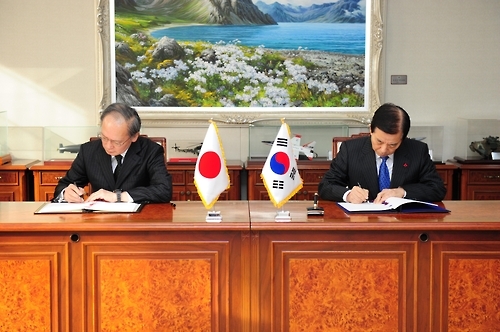South Korea and Japan signed a pact on Wednesday to share military intelligence to better counter mounting missile and nuclear threats from North Korea.
Defense Minister Han Min-koo and Japanese Ambassador to Seoul Yasumasa Nagamine officially signed the General Security of Military Information Agreement at the defense ministry in Seoul.
The final signing comes less than a month after discussions resumed on Oct. 27, following a hiatus of four years. They tentatively signed the pact last week.
On Tuesday, President Park Geun-hye approved the bilateral military
information sharing pact after it was passed by the Cabinet.
Once it goes into effect, the pact will allow the two countries to directly share information on Pyongyang without having to go through the United States.

South Korea expects to fully utilize Japan's advanced information-gathering capabilities on the North's nuclear and missile programs through the agreement. It believes Japan's satellite photos of North Korea, as well as its information on submarine-launched ballistic missiles will especially enhance the country's defense capabilities.
"If we can obtain military information on Pyongyang's nuclear and missile programs both from the US and Japan, it will greatly strengthen our ability to counter the North's provocations," a defense ministry official said.
He also said the two countries are obliged to keep military information on Pyongyang secret without disclosing to a third party under the pact.
Japan's information-gathering assets include five surveillance satellites, six Aegis destroyers, four radar systems with a detection range of over 1,000 kilometers, early warning aircraft, and 77 maritime patrol aircraft, according to the ministry.
But three opposition parties -- the Minjoo Party, the People's Party and the Justice Party -- lashed out at the deal, calling it "a rush job" that did not take into account the public's opinion.
They said they will consider submitting a joint motion to dismiss the defense minister.
Opposition parties and progressive activists have opposed the deal, arguing Japan has not sincerely apologized for its wartime atrocities while moving to expand its military role overseas.
In December 2014, South Korea, the US and Japan signed a preliminary deal that called for the voluntary sharing of military secrets on North Korea's nuclear and missile programs. The deal allows Seoul and Tokyo to share such intelligence via the US after their bilateral pact fell through in 2012.
Pyongyang's repeated provocations have provided strong momentum for Seoul and Tokyo to resume discussions on the GSOMIA. The communist country conducted two underground nuclear tests this year alone, following detonations in 2006, 2009 and 2013.
Defying international condemnation, North Korea has also test-fired more than 20 ballistic missiles so far this year, including intermediate-range Musudan and submarine-launched missiles.
Currently, Seoul maintains pacts with 32 countries on sharing military information. It has recently asked China to start negotiations on such a pact, but China has not yet responded. (Yonhap)









![[Hello India] Hyundai Motor vows to boost 'clean mobility' in India](http://res.heraldm.com/phpwas/restmb_idxmake.php?idx=644&simg=/content/image/2024/04/25/20240425050672_0.jpg&u=)








